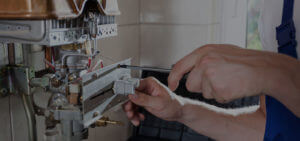Hot water is an essential amenity in any home. Cleaning, cooking, and comfort all depend on a fresh supply of hot water. Most homes use conventional gas or electric water heaters to keep showers and mop buckets hot. But like any HVAC workhorse that must perform on demand, day-in and day-out, water heaters are prone to breakdowns. And although routine preventative maintenance is crucial to extending the life of your equipment, water heaters will naturally expire after several years of service.
Replacing a water heater be daunting, but practicing vigilance can help better evaluate your equipment and prepare. Consider replacing your water heater sooner, rather than later if you notice any of the following signs.
- Knocking and Rumbling
Strange noise coming from the water heater as it starts working is one of the most noticeable signs of failing equipment. Sediment build up is a possible cause of knocking and rumbling that can be fixed before the problem gets any worse. When an aging water heater is continually called upon to heat and reheat water, sediment starts to form on the bottom of the tank. Over time, the sediment hardens and grows thicker along the tank floor.
Noise from a water heater caused by sediment buildup means the tank will eventually leak. If the knocking and rumbling continues after an HVAC professional performs a flush, then the problem is more critical, and the water heater should be replaced immediately.
- Rust
Rusty water from sink faucets or rusty valves on your water heater could mean a leak is coming soon. When corrosion takes hold on a steel surface, it slowly spreads and eats through the metal. If you spot rust around the water inlet or pressure relief valve on the heater, it’s likely that rust has also taken hold inside the tank. If that’s the case, the only option is to replace the tank as soon as possible.
If you have galvanized piping, you may have rusty pipes. A good test to avoid replacing a functioning water heater is to drain a few five-gallon buckets of hot water out of the water heater. By the third bucket, if the water from your heater is still coming out rusty, then most likely the water heater is at fault.
- Lukewarm Water
Consistent, lukewarm water is not only frustrating, but also a sign of a malfunctioning or inadequate water heater. The loss of heat in your water supply is likely due to either a misadjusted thermostat, a broken heating element, or a tank that’s too small for the size of your house. Correctly setting your water heater thermostat between 120 and 140 degrees could solve the first problem, but for the other two concerns, you’ll need to invest in a new water heater.
Conclusion
Replacing a water heater on short notice can feel like a hassle, but it’s important to take care of this task for the comfort of your home and family. Fortunately, John’s Services and Sales can help make the transition as smooth as possible. Our professional designers and estimators are dedicated to providing you with an outstanding, reliable, and efficient mechanical and plumbing system. When it’s time to replace your water heater, reach out to the expertise at John’s Services and Sales for the system that’s right for you.


